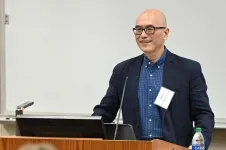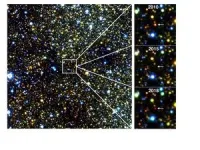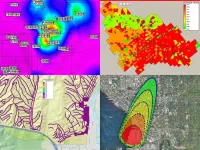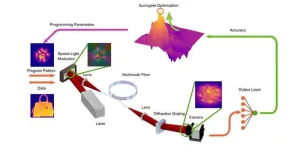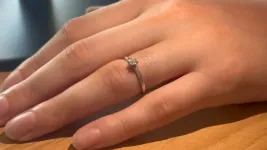(Press-News.org) CHICAGO—January 25, 2024—Illinois Institute of Technology (Illinois Tech) Professor Chun Liu has been elected a 2024 fellow of the American Mathematical Society (AMS)—one of just 40 mathematical scientists to be honored this year for his contribution to mathematics.
“It’s nice to be recognized by my colleagues, but this also gives visibility for the whole department and Illinois Tech,” says Liu, chair of the Department of Applied Mathematics. “It’s great recognition for the mathematics research that’s going on here at Illinois Tech.”
Liu’s research includes partial differential equations and calculus of variations, and their applications in complex fluids. Liu has published over 180 publications. His research projects have been continuously supported by the National Science Foundation, the United States Department of Energy, and various federal and international research foundations.
Liu says faculty researchers in the Department of Applied Mathematics not only delve into heavy mathematics theory, but also in how to apply that theory into a variety of fields, which makes the research that they conduct important and unusual. Mathematics researchers at Illinois Tech have made great contributions to fields such as data science, finance, engineering, biology, and materials science through collaborative research.
“The Department of Applied Mathematics at Illinois Tech is very strong in research with collaborators, both in and out of Illinois Tech, in many different areas,” Liu says. “For instance, more than 70 percent of the faculty in the department are doing research related to data sciences and machine learning.”
Liu has been the recipient of several awards, including Householder Lecturer at Oak Ridge National Laboratory in 2019. He has also long served as editor for the SIAM Journal on Mathematical Analysis Communications in Mathematical Sciences Interfaces and Free Boundaries Kinetic and Related Models Analysis and Application Journal of Mathematical Study; and Computational and Mathematical Biophysics (CMB).
AMS has been honoring fellows for the past 12 years in order create an enlarged class of mathematicians recognized by their peers; lift the morale of the profession; make mathematicians more competitive for awards, promotions, and honors; and support the advancement of more mathematicians in leadership positions in their own institutions and in broader society.
“It is my pleasure to congratulate and welcome the new class of AMS fellows, honored for their outstanding contributions to the mathematical sciences and to our profession,” says Bryna Kra, AMS president. “This year’s class was selected from a large and excellent pool of candidates, highlighting the many ways in which our profession is advanced, and I look forward to working with them in service to our community.”
The fellowship was formally bestowed at the Joint Mathematics Meeting in San Francisco earlier this month.
END
Illinois Tech professor Chun Liu honored as 2024 Fellow by American Mathematical Society
Liu, chair of Illinois Institute of Technology’s Department of Applied Mathematics, researches partial differential equations and calculus of variations, and their applications in complex fluids.
2024-01-25
ELSE PRESS RELEASES FROM THIS DATE:
Chats with AI shift attitudes on climate change, Black Lives Matter
2024-01-25
MADISON — People who were more skeptical of human-caused climate change or the Black Lives Matter movement who took part in conversation with a popular AI chatbot were disappointed with the experience but left the conversation more supportive of the scientific consensus on climate change or BLM. This is according to researchers studying how these chatbots handle interactions from people with different cultural backgrounds.
Savvy humans can adjust to their conversation partners’ political leanings and cultural expectations to make sure they’re understood, but more and more often, humans find themselves in ...
PNNL Software Technology wins FLC Award
2024-01-25
RICHLAND, Wash.—Visual Sample Plan (VSP), a free software tool developed at the Department of Energy's Pacific Northwest National Laboratory (PNNL) that boosts statistics-based planning, has been recognized with a 2024 Federal Laboratory Consortium (FLC) Award.
The FLC represents over 300 federal laboratories, agencies, and research centers. The annual FLC awards program recognizes agencies for their contributions to technology transfer, which turns innovative research into impactful products and services.
Judges bestowed ...
Programming light propagation creates highly efficient neural networks
2024-01-25
Current artificial intelligence models utilize billions of trainable parameters to achieve challenging tasks. However, this large number of parameters comes with a hefty cost. Training and deploying these huge models require immense memory space and computing capability that can only be provided by hangar-sized data centers in processes that consume energy equivalent to the electricity needs of midsized cities. The research community is presently making efforts to rethink both the related computing hardware and the machine learning algorithms to sustainably keep the development of artificial intelligence at its current pace.
Optical implementation ...
Advincula earns prestigious NAI fellow honor
2024-01-25
Rigoberto “Gobet” Advincula has been awarded one of the highest honors of his profession.
Advincula, the University of Tennessee-Oak Ridge National Laboratory Governor’s Chair of Advanced and Nanostructured Materials, has been elected National Academy of Inventors (NAI) Fellow.
Advincula is a leader in the polymer field with inventions and many publications in polymer nanocomposites, graphene nanomaterials, polymer layered films, and coatings. He has been granted 14 US patents and has 21 published filings related to graphene nanomaterials, solid-state device fabrication, smart coatings and films, ...
Sweat-analyzing temporary tattoo research funded in NSF grant to UMass Amherst researcher
2024-01-25
AMHERST – University of Massachusetts Amherst researchers have received an award to develop a new type of sweat monitor that can be applied to the skin just like a temporary tattoo and assess the molecules present, such as cortisol. The tattoos will ultimately give individuals better insight into their health and serve as a tool for researchers to discover new early indications of diseases.
“There are a lot of vital biomolecules that are present in sweat that we need to measure to really understand overall human performance and correlation to different ...
Simulations show how HIV sneaks into the nucleus of the cell
2024-01-25
Because viruses have to hijack someone else’s cell to replicate, they’ve gotten very good at it—inventing all sorts of tricks.
A new study from two University of Chicago scientists has revealed how HIV squirms its way into the nucleus as it invades a cell.
According to their models, the HIV capsid, which is cone-shaped, points its smaller end into the pores of the nucleus and then ratchets itself in. Once the pore is open enough, the capsid is elastic enough to squeeze through. Importantly, the scientists ...
White House rule dramatically deregulated wetlands, streams and drinking water
2024-01-25
The 1972 Clean Water Act protects the "waters of the United States" but does not precisely define which streams and wetlands this phrase covers, leaving it to presidential administrations, regulators, and courts to decide. As a result, the exact coverage of Clean Water Act rules is difficult to estimate.
New research led by a team at the University of California, Berkeley, used machine learning to more accurately predict which waterways are protected by the Act. The analysis found that a 2020 Trump administration rule removed Clean Water Act ...
How an ant invasion led to lions eating fewer zebra in a Kenyan ecosystem
2024-01-25
The invasion of non-native species can sometimes lead to large and unexpected ecosystem shifts, as Douglas Kamaru and colleagues demonstrate in a unique, careful study that traces the links between big-headed ants, acacia trees, elephants, lions, zebras, and buffalo at a Kenyan conservancy. The invasive big-headed ant species disrupted a mutualism between native ants and the region’s thorny acacia trees, in which the native ants protected the trees from grazers in exchange for a place to live. Through a combination of observations, experimental plots, and animal tracking at Ol Pejeta Conservancy, Kamaru et al. followed the ecosystem chain reaction prompted by this disruption. ...
Total organic carbon concentrations measured over Canadian oil sands reveal huge underestimate of emissions
2024-01-25
New measurements of total gaseous organic carbon concentrations in the air over the Athabasca oil sands in Canada suggest that traditional methods of estimating this pollution can severely underestimate emissions, according to an analysis by Megan He and colleagues. Using aircraft-based measurements, He et al. conclude that the total gaseous organic carbon emissions from oil sands operations exceed industry-reported values by 1900% to over 6300% across the studied facilities. “Measured facility-wide emissions represented approximately 1% of extracted petroleum, resulting in total organic ...
Machine learning model identifies waters protected under different interpretations of the U.S. Clean Water Act
2024-01-25
The U.S. Clean Water Act is a critically important part of federal water quality regulation, but the act does not define the exact waters that fall under its jurisdiction. Now, Simon Greenhill and colleagues have developed a machine learning model that helps to clarify which waters are protected from pollution under the United States’ Clean Water Act, and how recent rule changes affect protection. The model demonstrates that the waters protected under the act differ substantially depending on whether the act’s regulations follow a 2006 U.S. Supreme Court ruling or a 2020 White House rule. Under the 2006 Rapanos Supreme Court ruling, the model suggests that the Clean ...
LAST 30 PRESS RELEASES:
Visible light-driven deracemization of α-aryl ketones synergistically catalyzed by thiophenols and chiral phosphoric acid
Most AI bots lack basic safety disclosures, study finds
How competitive gaming on discord fosters social connections
CU Anschutz School of Medicine receives best ranking in NIH funding in 20 years
Mayo Clinic opens patient information office in Cayman Islands
Phonon lasers unlock ultrabroadband acoustic frequency combs
Babies with an increased likelihood of autism may struggle to settle into deep, restorative sleep, according to a new study from the University of East Anglia.
National Reactor Innovation Center opens Molten Salt Thermophysical Examination Capability at INL
International Progressive MS Alliance awards €6.9 million to three studies researching therapies to address common symptoms of progressive MS
Can your soil’s color predict its health?
Biochar nanomaterials could transform medicine, energy, and climate solutions
Turning waste into power: scientists convert discarded phone batteries and industrial lignin into high-performance sodium battery materials
PhD student maps mysterious upper atmosphere of Uranus for the first time
Idaho National Laboratory to accelerate nuclear energy deployment with NVIDIA AI through the Genesis Mission
Blood test could help guide treatment decisions in germ cell tumors
New ‘scimitar-crested’ Spinosaurus species discovered in the central Sahara
“Cyborg” pancreatic organoids can monitor the maturation of islet cells
Technique to extract concepts from AI models can help steer and monitor model outputs
Study clarifies the cancer genome in domestic cats
Crested Spinosaurus fossil was aquatic, but lived 1,000 kilometers from the Tethys Sea
MULTI-evolve: Rapid evolution of complex multi-mutant proteins
A new method to steer AI output uncovers vulnerabilities and potential improvements
Why some objects in space look like snowmen
Flickering glacial climate may have shaped early human evolution
First AHA/ACC acute pulmonary embolism guideline: prompt diagnosis and treatment are key
Could “cyborg” transplants replace pancreatic tissue damaged by diabetes?
Hearing a molecule’s solo performance
Justice after trauma? Race, red tape keep sexual assault victims from compensation
Columbia researchers awarded ARPA-H funding to speed diagnosis of lymphatic disorders
James R. Downing, MD, to step down as president and CEO of St. Jude Children’s Research Hospital in late 2026
[Press-News.org] Illinois Tech professor Chun Liu honored as 2024 Fellow by American Mathematical SocietyLiu, chair of Illinois Institute of Technology’s Department of Applied Mathematics, researches partial differential equations and calculus of variations, and their applications in complex fluids.
